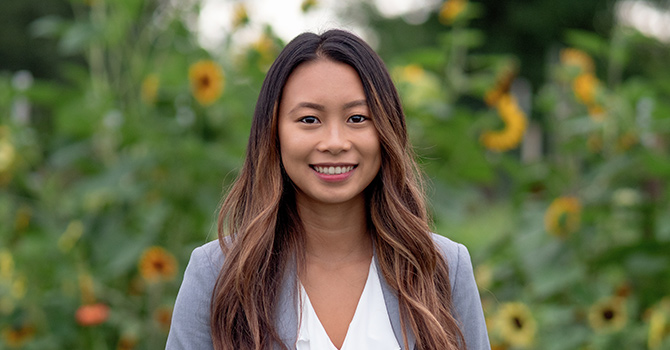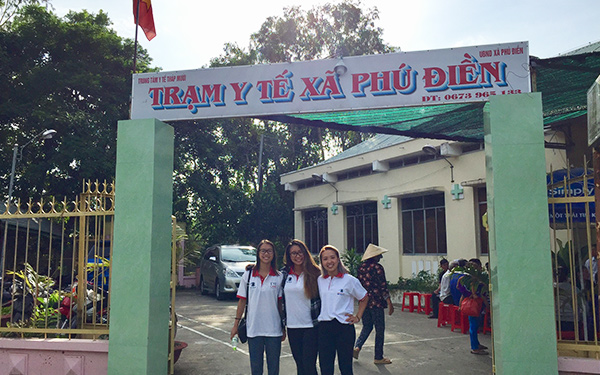You’re Never Too Young to Have a Global Reach

Kim-Ngan Nguyen
Bachelor’s student in Public Health
This article was published before the name of the Department of Health Behavior & Health Education changed to the Department of Health Behavior & Health Equity. Learn more about this change.Before college, I had no idea that public health was even a field that existed let alone one that I would be so interested in. What was so attractive about this field to me was how interdisciplinary it is. We’re looking at health issues but also at social issues like economics, racial equity, and access to resources.
I was drawn to the mission of public health but even more to the people of the undergraduate program here. The community at the School of Public Health struck me right away as incredibly empathetic and compassionate about the issues they are tackling and the world they are engaging—I quickly realized it was something I needed to be a part of.
I'm part of a student organization on campus called Pencils of Promise Michigan. We help build schools, train teachers, and provide quality education and health education programs to children in Ghana, Guatemala, Laos, and Nicaragua. We raise money through a variety of campus-based activities. One of the initiatives that has come out of the national Pencils of Promise organization is the Water, Sanitation, and Hygiene (WASH) program, where kids learn about hygiene practices and are given access to clean water. As a student of public health, it’s exciting to be a part of that effort in some small way. It is especially meaningful for me because my sister Anh helped start the Pencils of Promise chapter here on campus at Michigan.
Many people around the world do not have opportunities to access educational resources. Contributing to the national Pencils of Promise effort is my way of paying it forward.
The mission of Pencils of Promise is close to my heart. I'm originally from Vietnam, a country similar to those helped by the organization. My family moved to Michigan when I was in grade school, and I’ve attended schools here ever since. But I have friends, family, and neighbors back in Vietnam who didn't get to finish school because they simply couldn't afford it. I’ve realized that public education is a first-world privilege; Many people around the world do not have opportunities to access educational resources. Contributing to the national Pencils of Promise effort is my way of paying it forward. I was fortunate to receive my education here, and I can use that education to contribute to helping build an educational foundation for children in other countries. It will help those children live healthier lives, as I've been able to.
I was actually able to return to Vietnam in the summer of 2019 for a study abroad program in Ho Chi Minh City. In addition to coursework, I interned at the Eye Care Foundation (ECF). ECF is doing wonderful work in areas around the Vietnam, like in Dong Thap, where they provide free vision screening to residents. I spent my time there working on a project to reach older people in rural areas of Vietnam. We promoted eye health and encouraged them to participate in regular vision screenings. Culturally, many elderly people in Vietnam are more receptive to receiving advice from peers or neighbors, so my team created a video featuring people from our target audience to encourage them to take advantage of ECF’s services.
We visited the individuals around the town and interviewed others at eye clinics. We prepared our questions in advance, which was a good opportunity to learn about creating and using culturally sensitive public health communication. At first, it was really hard for us to approach them, and many were reluctant to be on camera. Eventually, people warmed up to us because we were speaking to them in their language and talking about things that would benefit their personal health. In Vietnamese culture, hospitality is important, so the people we interviewed were very open once they decided to talk to us. It seemed like they actually enjoyed it. We were grateful that they welcomed us so warmly, especially since we were discussing health issues that can be very personal to some.
I was able to see the impact of the education I’m getting here at the School of Public Health and how it truly can help people around the world.
The project allowed my peers and I to be a part of EFC’s care center team and interact with many real patients. It was a great experience personally because I was able to practice my Vietnamese language skills in a professional setting—something I hadn’t done before. Most importantly, I saw public health in action. I was able to see the impact of the education I’m getting here at the School of Public Health and how it truly can help people around the world.

Ngan (center) and study abroad peers at a health care center in Vietnam.
I'm inspired to learn as much as I can and to build as many meaningful relationships as I can. I'm interested in localized health work because I grew up in Grand Rapids. This community is a genuine blend of people, culture, and social class, and I’d like to be in a position to help all types of people. I don't want to change people's lives, I just want to give people what they deserve so they can change their own lives.
Sometimes as public health professionals, we forget that people aren't just statistics, that they are more than “at-risk youth” or “vulnerable populations”—they are friends and family and people and they deserve to have a healthy and happy life too. Being an agent of support and change at a local level, I can connect with the community in a way that professionals in broader, population-level roles don't always experience.
